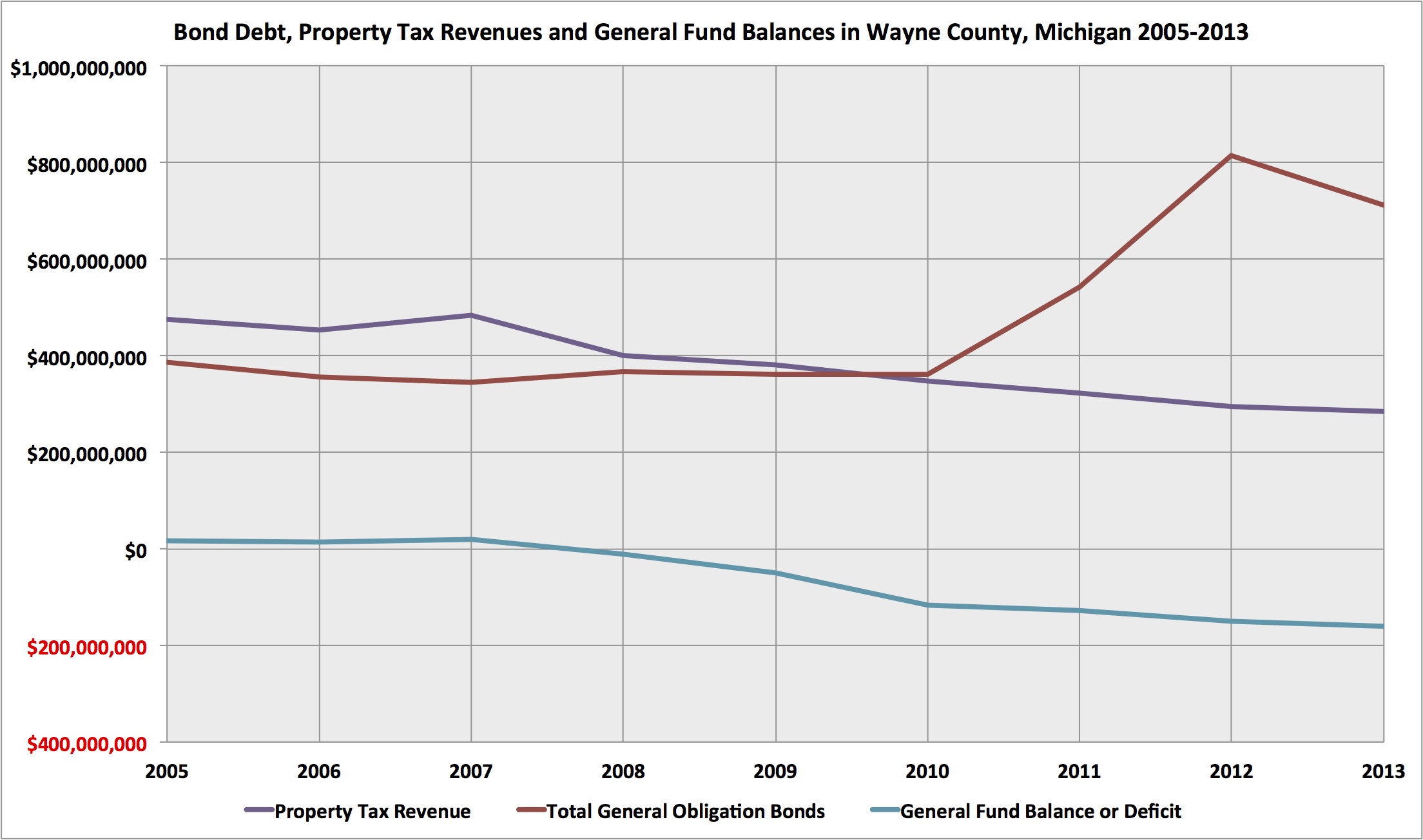Connecting state and local government leaders
The Wolverine State’s most-populous county, home to Detroit, may be on the verge of a “financial emergency.”
This is the third installment in Stats Shot, a semi-regular series of posts looking at the statistics that shape state, county and municipal governments and the communities they serve across the United States.
Property tax revenue began falling in Wayne County, Michigan in 2008 and, since then, the decline has continued unabated.
Between fiscal years 2007 and 2013, collections dropped from about $485 million to around $285 million—a 41 percent decrease, based on figures in the county’s comprehensive annual financial reports. Property taxes have traditionally been an important source of financial lifeblood for Wayne. They provided 18 percent of revenue for government activities there in 2013.

But falling property tax revenue is just one factor that has left finances strained in the county, which is home to the city of Detroit and has a population of approximately 1.7 million people.
The mounting fiscal pressure led County Executive Warren C. Evans to petition the state of Michigan in mid-June to declare a financial emergency in the jurisdiction.
His move prompted a preliminary review, which culminated in a report from state Treasurer Nick A. Khouri’s office. Michigan’s Local Emergency Financial Assistance Loan Board then determined on July 1 that “probable financial stress” exists in Wayne and, the next day, Gov. Rick Snyder appointed a team to further examine the county’s finances.
Depending on what the team concludes, and what Snyder decides based on their findings, a financial emergency could be declared in the county.
A number of outcomes would be possible if that happens. One option is a consent agreement between the county and the state, which, according to information published last week by Moody’s Investors Service, Evans has recommended. Other possibilities include the appointment of an emergency manager, a neutral evaluation process with creditors, or the declaration of Chapter 9 bankruptcy.
Detroit filed for Chapter 9 protection in July 2013, and emerged from bankruptcy last December.
Below are some of the figures that further outline the scope of Wayne County’s troubles.
From the report issued by Khouri’s office:
General Fund: The county's general fund is used to pay for basic government operations such as police and courts. The fund's deficit exceeded $100 million from fiscal 2010-2013.
- Unrestricted General Fund Deficit in 2014: $82.8 million
- Unrestricted General Fund Deficit in 2013: $156.4 million
Pensions: Funding levels for the county's primary plan declined between 2004 and 2013, while liabilities increased.
- Funded Ratio for the County’s Primary Pension Plan in 2013: 45.0 percent
- Funded Ratio for the County’s Primary Pension Plan in 2004: 94.8 percent
- Liability for the County’s Primary Pension Plan 2013: $910.5 million
- Liability for the County’s Primary Pension Plan 2004: $49.6 million
The Jail Project: In 2013, the county stopped construction on a bond-financed jail facility due to estimated cost increases. Debt service payments on the bonds have continued, the jail remains unfinished.
- Initial Cost Estimate for the New County Jail Facility: $300 million
- Jail Construction Bonds Issued in December 2010: $200 million*
- Revised Cost Estimate for the Jail when Construction Stopped in 2013: $391 million
- Estimated Amount of Money Spent on Jail Construction So Far: $151 million**
- Debt Service on Jail Construction Bonds May 1, 2014-April 30, 2015: $14.3 million
*From the county’s 2010 comprehensive annual financial report
**From Moody’s Investors Service
From Wayne County's Comprehensive Annual Financial Reports:
Debt: Outstanding general obligation bonds in Wanye County hovered below $400 million between 2005 and 2010, before rising substantially during 2011 and 2012.
- Total General Obligation Bonds 2013: $712,200,000
- Total General Obligation Bonds 2012: $815,222,000
- Total General Obligation Bonds 2011: $542,226,000
- Total General Obligation Bonds 2010: $360,971,000
From the U.S. Census Bureau:
Demographics: The county's population has declined over the last 15 years, while household income has stayed relatively stagnant.
- Population Estimate 2014: 1,764,804
- Population Estimate 2000: 2,061,162
- Median Household Income 2009-2013: $41,184
- Median Family Income 1999: $40,776
Gary Woronchak, chairman of the Wayne County Commission, did provide comments on some of the number’s included in the report from the treasurer’s office.
For instance, he said that the sizeable 2014 deficit reflected a “conscious choice” by Evans’ administration, and that it could have potentially been much lower had money been allocated differently. Woronchak also noted that the pension funding level went up in 2014, to 47 percent.
The public was given a chance to provide input and ask questions about the financial review process last Friday. Members of the review team were on hand for a meeting that was held in the Wayne County Commission chambers in the Guardian Building. Located in downtown Detroit, the county is currently trying to sell the building in an effort to raise money.
Bill Lucia is a Reporter for Government Executive’s Route Fifty.

NEXT STORY: States Battle Cities Over Minimum Wage




